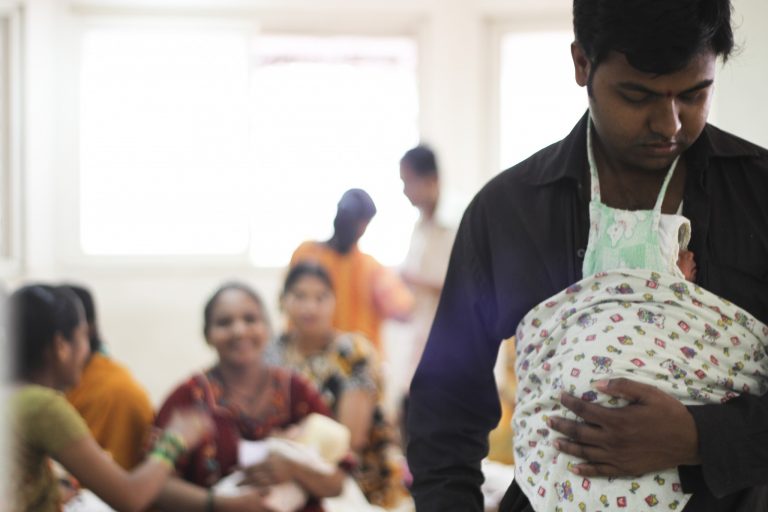When a new baby enters the world, the focus is often given to the mother and her fundamental role as the lifeline to her small and fragile baby. This relationship is called the mother-baby dyad, and is most important during the first 28 days of a baby’s life, also known as the newborn period. This dyad becomes ever more critical for survival if the baby is born early, has a low birth weight or is sick. For example, there is an increased risk of admission to the Neonatal Intensive Care Unit (NICU) for infants after birth and poorer survival for children if the mother dies. Mothers also uniquely provide breastfeeding or lactation and skin-to-skin contact or Kangaroo Mother Care (KMC), which has well-documented benefits for both the infant and the mother. (Learn more here and here).
Despite the importance of the mother-baby dyad, men also play a very unique and critical role as fathers, male caregivers, male family members, and community members. For example, fathers and other male caregivers can also provide skin-to-skin care and support mothers in breastfeeding or providing breast milk for the infant. Their role, not only in parenting and household decision making, is important in upholding and reinforcing healthy behaviors for mother and baby. In many settings, men are the key decision-makers surrounding maternal and newborn care seeking behaviors, and that is especially important when identifying if mother or baby is in distress or in need of medical attention.
There are two recent examples of community mobilization efforts influencing male involvement in newborn care. In Ethiopia, the implementation of a Demand Creation Strategy for Maternal, Newborn and Child Health/Community-based Newborn Care from 2015 to 2017 increased community capacity and mobilization catalyzes the ownership of maternal and newborn health. The strategy supported and engaged individuals closest to the newborn, specifically targeting male caretakers and household decision-makers, through a combination of community empowerment approaches. The goal is to reinforce behavior change which improve family demand for healthcare services at a broader level, benefitting all newborns in the community. An evaluation of key outcomes revealed that the strategy increased male involvement in decision-making and support for MNCH care practice and careseeking.
In Malawi, a social and behavioral change communication (SBCC) campaign was implemented to improve care for low birth weight and preterm babies (Learn more here). Because these babies have historically been undervalued in Malawi, they may go untreated for prematurity or die from other preventable conditions. The SBCC campaign addressed these harmful cultural practices and beliefs by engaging men in helping to shift norms, increase the value of newborn lives and prioritize their survival. The results of the campaign show that community members were able to recall messages about preterm or low birth weight babies, provision of kangaroo mother care, the critical role of male involvement in both.
There is still a long road ahead of us, as healthcare itself is traditionally structured to interact primarily with the mothers-baby dyad, which is a huge barrier for male involvement in the health of the mother-baby dyad. There is a clear disconnect here. Instead of being structured to interact with mother and baby, expanding the health programs to actively engage male partners and caregivers can directly benefit newborns. Information for men to understand the needs, risks and danger signs of pregnancy, childbirth and postnatal periods should be designed and provided. Health providers’ skills should also be strengthened to enhance couple communication and decision-making around the time of birth and supporting their partners’ decisions when caring for a newborn.
Ultimately, when men are empowered to embrace caretaking roles, they contribute to a shift in cultural beliefs while supporting the mother-baby dyad. This can allow for deeper and more meaningful involvement with baby, higher levels of acceptability of newborn health programs, and more equitable partnerships between parents, all of which benefit the newborn and the entire family unit.
